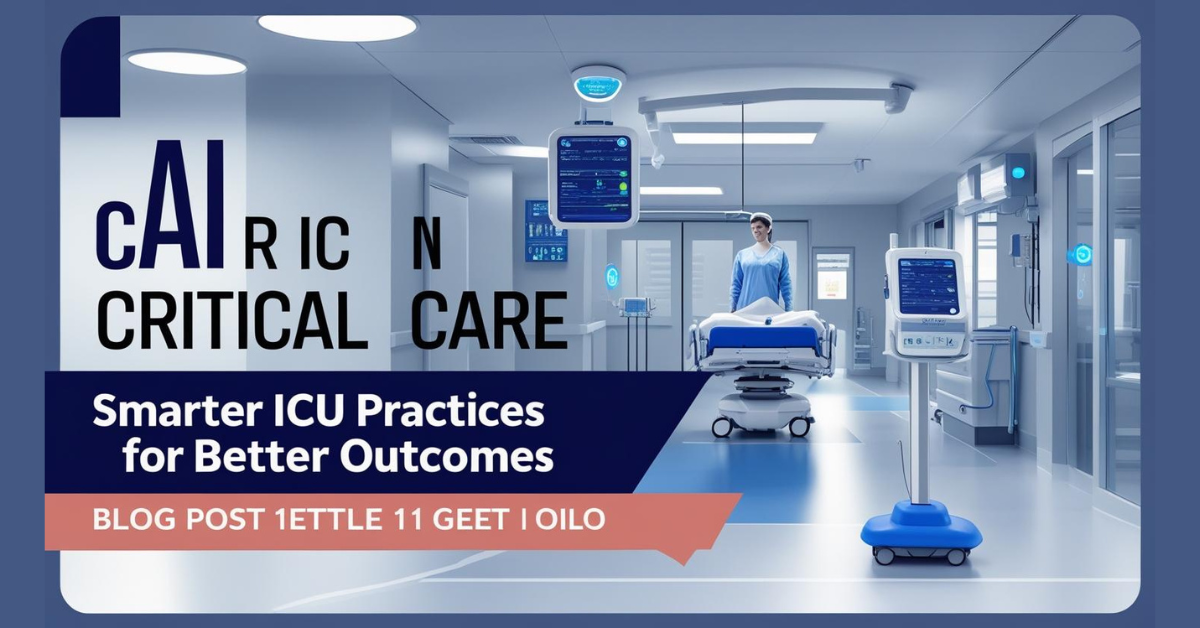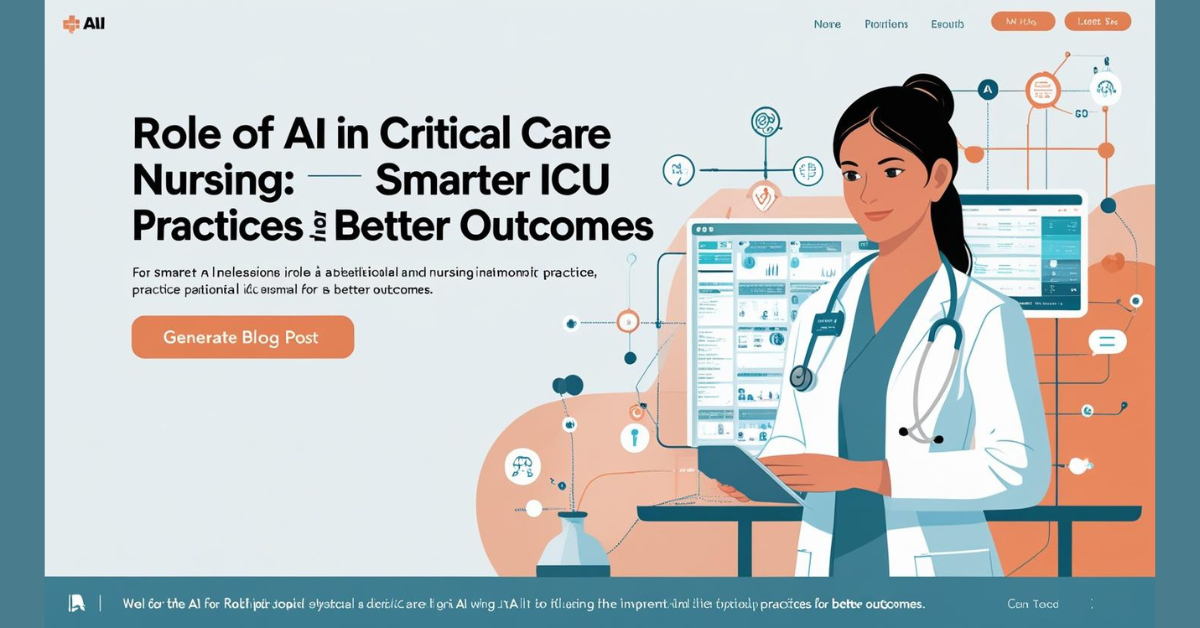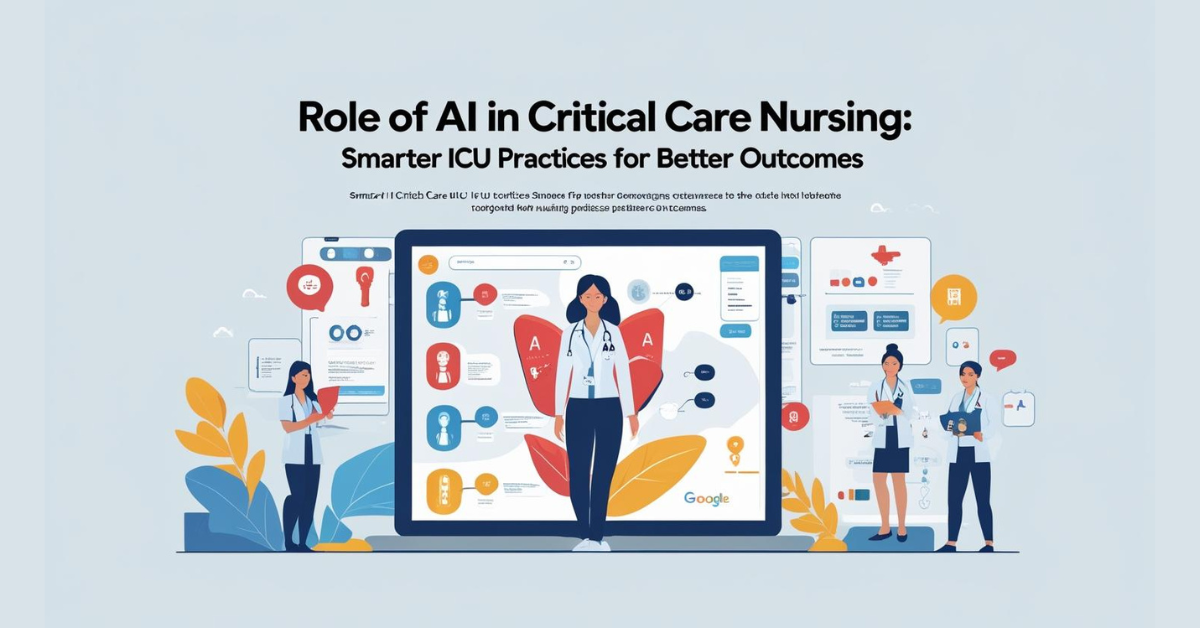The Role of AI in Critical Care Nursing Smarter ICU Practices for Better Outcomes. AI is transforming critical care by improving decision-making, streamlining workflows, and optimizing patient outcomes.
The Role of AI in Critical Care Nursing Smarter ICU Practices for Better Outcomes
AI-based tools can analyze large amounts of data, predict potential complications, and automate routine tasks, allowing nursing staff to focus on complex patient needs. This results in more efficient and personalized care and ultimately optimizes patient safety and well-being in the ICU.
AI has the potential to revolutionize critical care by improving clinical decision-making, streamlining workflows, and optimizing patient outcomes. However, addressing the ethical, technical, and practical challenges associated with implementing AI is critical to ensuring its safe and effective use in the ICU.
Current Applications of AI in Critical Care
AI is remodeling essential care nursing via numerous key packages that at once effect affected person outcomes. Real-time facts evaluation for the early detection of affected person deterioration, automation of recurring tasks, and augmentation of medical information are the various maximum giant blessings presently being realized.
Early Warning Systems and Predictive Analytics
One of the maximum impactful programs is AI-powered early caution structures. AI-primarily based totally fashions extensively decreased in-sanatorium and 30-day mortality rates, representing a main leap forward in affected person safety. These structures constantly display affected person information to pick out deterioration earlier than it will become clinically obvious to human observers.
Predictive algorithms have validated excessive accuracy in forecasting affected person deterioration, allowing well timed interventions and lowering mortality rates. This functionality is especially important in ICU settings in which fast adjustments in affected person circumstance may be life-threatening.
Workflow Enhancement and Clinical Decision Support
AI is streamlining nursing workflows in numerous ways. AI tools, together with predictive analytics and automatic documentation systems, had been proven to enhance affected person results even as minimizing the hazard of human mistakes in ordinary tasks. This permits nurses to recognition extra on direct affected person care as opposed to administrative tasks.
Artificial intelligence driven triage models leverage numerous affected man or woman information for improved very last consequences predictions, surpassing human usual overall performance in retrospective studies, demonstrating AI`s functionality to beautify clinical decision-making accuracy.
Challenges and Implementation Thoughts
Despite those advances, implementation faces many limitations. While nurses recounted AI`s capacity to streamline workflows, enhance statistics analysis, and facilitate early affected person deterioration detection, worries arose concerning workload, data overload, and problems deciphering AI outputs.
Major limitations to sizable powerful utility of AI methods to the real-time care of the significantly sick consist of integration demanding situations with current structures and the want for correct schooling and assist for nursing staff.
Measurable Outcomes and Impact
Recent research display promising results. AI fashions shortened standard clinic remains whilst enhancing affected person protection metrics. The generation is especially powerful in ICU environments wherein the extensive care unit (ICU), recognized for its reliance on a sizeable quantity of scientific information, and provides a promising road for the deployment of robot AI, predicted to convey tremendous upgrades to affected person care.
Future Directions
The integration of AI in vital care nursing represents a substantial shift closer to greater precise, predictive, and green healthcare delivery. AI has the ability to help docs with inside the complicated method of assessing affected person threat tiers for treatments, figuring out individuals who are maximum in all likelihood to revel in a unexpected deterioration, and studying more than one small results to beautify typical affected person results.
As those technology hold to evolve, the point of interest stays on developing structures that supplement in place of update human expertise, in the end main to safer, greater powerful vital care environments wherein nurses can offer higher affected person results via improved decision-making equipment and automatic assist structures.
Read More:
https://nurseseducator.com/didactic-and-dialectic-teaching-rationale-for-team-based-learning/
https://nurseseducator.com/high-fidelity-simulation-use-in-nursing-education/
First NCLEX Exam Center In Pakistan From Lahore (Mall of Lahore) to the Global Nursing
Categories of Journals: W, X, Y and Z Category Journal In Nursing Education
AI in Healthcare Content Creation: A Double-Edged Sword and Scary
Social Links:
https://www.facebook.com/nurseseducator/
https://www.instagram.com/nurseseducator/
https://www.pinterest.com/NursesEducator/
https://www.linkedin.com/in/nurseseducator/
https://www.researchgate.net/profile/Afza-Lal-Din
https://scholar.google.com/citations?hl=en&user=F0XY9vQAAAAJ


